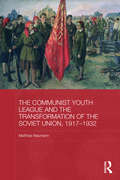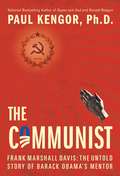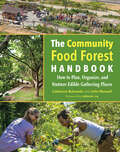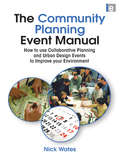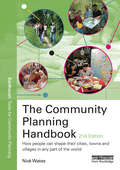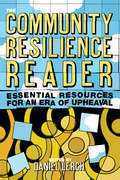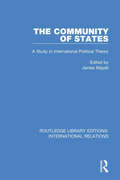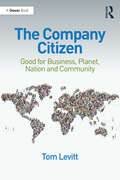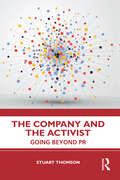- Table View
- List View
The Communist Successor Parties of Central and Eastern Europe
by John T. Ishiyama Andras BozokiWhat has become of the Communist parties that once held monopoly power in the east bloc? A decade ago, it was assumed that they would dissolve, but many of them have enjoyed electoral success. This book systematically examines how they have evolved. In the opening section, Herbert Kitschet and Ivan Szelenyi respectively consider post-communist party strategies and social democratic prospects in the transitional societies. Part II presents nine case studies of the major communist and communist successor parties of the region, and Part III is devoted to seven comparative studies. Appendices provide comparable electoral and party membership data.
The Communist Youth League and the Transformation of the Soviet Union, 1917-1932 (BASEES/Routledge Series on Russian and East European Studies)
by Matthias NeumannThe study of Soviet youth has long lagged behind the comprehensive research conducted on Western European youth culture. In an era that saw the emergence of youth movements of all sorts across Europe, the Soviet Komsomol was the first state-sponsored youth organization, in the first communist country. Born out of an autonomous youth movement that emerged in 1917, the Komsomol eventually became the last link in a chain of Soviet socializing agencies which organized the young. Based on extensive archival research and building upon recent research on Soviet youth, this book broadens our understanding of the social and political dimension of Komsomol membership during the momentous period 1917–1932. It sheds light on the complicated interchange between ideology, policy and reality in the league's evolution, highlighting the important role ordinary members played. The transformation of the country shaped Komsomol members and their league's social identity, institutional structure and social psychology, and vice versa, the organization itself became a crucial force in the dramatic changes of that time. The book investigates the complex dialogue between the Communist Youth League and the regime, unravelling the intricate process that transformed the Komsomol into a mere institution for political socialization serving the regime's quest for social engineering and control.
The Communist: The Untold Story of Barack Obama's Mentor
by Paul Kengor"I admire Russia for wiping out an economic system which permitted a handful of rich to exploit and beat gold from the millions of plain people. . . . As one who believes in freedom and democracy for all, I honor the Red nation." --FRANK MARSHALL DAVIS, 1947. In his memoir, Barack Obama omits the full name of his mentor, simply calling him "Frank." Now, the truth is out: Never has a figure as deeply troubling and controversial as Frank Marshall Davis had such an impact on the development of an American president.
The Communitarian Constitution
by Beau BreslinBowling Alone, the title of Robert Putnam's 1995 article (later a bestselling book) perfectly captured a sense of national unease: Somewhere along the way, America had become a nation divided by apathy, and the bonds that held together civil society were disappearing. But while the phrase resonated with our growing sense of atomization, it didn't describe a new phenomenon. The fear that isolation has eroded our social bonds had simmered for at least two decades, when communitarianism first emerged as a cogent political philosophy. Communitarianism, as explained in the works of Michael Sandel, Alasdair MacIntyre, Amitai Etzioni, and others, elevates the idea of communal good over the rights of individuals.Throughout the 1980s and 1990s, communitarianism gained popular and political ground. The Clintons touted its principles in the '90s, and the two presidents Bush make frequent references to its central tenets. In its short life, the philosophy has generated plenty of books, both pro and con. Beau Breslin's authoritative and original examination, The Communitarian Constitution, contributes to the debate from a wholly original standpoint. Existing critiques focus on the debate between liberalism and communitarianism—in other words, the conflict between individual rights and the communal good. Breslin takes an entirely different stance, examining the pragmatic question of whether or not communitarian policies are truly practicable in a constitutional society.In tackling this question, Breslin traces the evolution of American communitarianism. He examines Lincoln's unconstitutional Civil War suspension of habeas corpus and draws on Federalist and Anti-Federalist arguments, pegging the Anti-Federalists as communitarians' intellectual forebearers. He also grounds his arguments in the real world, examining the constitutions of Germany and Israel, which offer further insight into the relationship between constitutionalism and communitarianism.At a moment when American politicians and citizenry are struggling to balance competing needs, such as civil rights and homeland security, The Communitarian Constitution is vital reading for anyone interested in the evolving tensions between individual rights and the good of the community.
The Community College Baccalaureate: Emerging Trends and Policy Issues
by Deborah L. Floyd Michael L. Skolnik Kenneth P. Walker* Is the conferring of baccalaureate degrees by community colleges a solution to increasing access to and capacity in higher education?* Will the conferring of baccalaureate degrees restrict open access to, and imperil the existing mission of, community colleges?* What are the models and alternative methods of delivery? What are the implications?Breaking away from their traditional mission of conferring only associate degrees and occupational credentials, an increasing number of community colleges have begun seriously to explore and, indeed, in some U.S. states and Canadian provinces, to actually implement offering and conferring bachelor’s degrees. Some leaders see these changes as a natural extension of community colleges’ commitment to access, while others view their awarding of baccalaureate degrees as inappropriate and threatening the basic core values of this unique sector of higher education. This has become a "hot" and controversial topic, not only among community college and university leaders, but also among policy makers, business leaders and students concerned with issues of access, cost and the structure and purposes of post-secondary education. This book analyzes the emerging trend of the community college baccalaureate degree in the United States and Canada in order to contribute to the development of policy. The authors aim to describe, document, and explain this significant development in higher education. They present the background, examples of practice and different models of delivery, develop a common terminology to facilitate discussion, give voice to the views of proponents and critics alike, and include a comprehensive bibliography and set of resources. This book is intended as a catalyst for dialog, action and further research on this critical and emerging trend. It is essential reading for leaders of community colleges, for administrators and planners in higher education concerned with issues of access and articulation, and anyone in public policy grappling with demographic trends and society’s need for educated citizens able to meet the challenges of the future.
The Community Economic Development Movement: Law, Business, and the New Social Policy
by William H. SimonWhile traditional welfare efforts have waned, a new style of social policy implementation has emerged dramatically in recent decades. The new style is reflected in a panoply of Community Economic Development (ced) initiatives--efforts led by locally-based organizations to develop housing, jobs, and business opportunities in low-income neighborhoods. In this book William H. Simon provides the first comprehensive examination of the evolution of Community Economic Development, complete with an analysis of its operating premises and strategies. He describes the profusion of new institutional forms that have arisen from the movement, amalgamations that cut across conventional distinctions--such as those between private and public--and that encompass the efforts of nonprofits, cooperatives, churches, business corporations, and public agencies. Combining local political mobilization with entrepreneurial initiative and electoral accountability with market competition, this phenomenon has catalyzed new forms of property rights designed to motivate investment and civic participation while curbing the dangers of speculation and middle-class flight. With its examination of many localities and its appraisal of the strengths and weaknesses of the prevailing approach to Community Economic Development, this book will be a valuable resource for local housing, job, and business development officials; community activists; and students of law, business, and social policy.
The Community Food Forest Handbook: How to Plan, Organize, and Nurture Edible Gathering Places
by Catherine Bukowski John MunsellCollaboration and leadership strategies for long-term successFueled by the popularity of permaculture and agroecology, community food forests are capturing the imaginations of people in neighborhoods, towns, and cities across the United States. Along with community gardens and farmers markets, community food forests are an avenue toward creating access to nutritious food and promoting environmental sustainability where we live. Interest in installing them in public spaces is on the rise. People are the most vital component of community food forests, but while we know more than ever about how to design food forests, the ways in which to best organize and lead groups of people involved with these projects has received relatively little attention.In The Community Food Forest Handbook, Catherine Bukowski and John Munsell dive into the civic aspects of community food forests, drawing on observations, group meetings, and interviews at over 20 projects across the country and their own experience creating and managing a food forest. They combine the stories and strategies gathered during their research with concepts of community development and project management to outline steps for creating lasting public food forests that positively impact communities.Rather than rehash food forest design, which classic books such as Forest Gardening and Edible Forest Gardens address in great detail, The Community Food Forest Handbook uses systems thinking and draws on social change theory to focus on how to work with diverse groups of people when conceiving of, designing, and implementing a community food forest. To find practical ground, the authors use management phases to highlight the ebb and flow of community capitals from a project&’s inception to its completion. They also explore examples of positive feedbacks that are often unexpected but offer avenues for enhancing the success of a community food forest.The Community Food Forest Handbook provides readers with helpful ideas for building and sustaining momentum, working with diverse public and private stakeholders, integrating assorted civic interests and visions within one project, creating safe and attractive sites, navigating community policies, positively affecting public perception, and managing site evolution and adaptation. Its concepts and examples showcase the complexities of community food forests, highlighting the human resilience of those who learn and experience what is possible when they collaborate on a shared vision for their community.&“A highly useful guide based on the collective wisdom of people and communities who are defining this practice as they develop it on the ground. The thoughtful analysis of planning strategies and numerous case studies of active projects help us all understand what community food forests are and can be for the future.&”—Steve Gabriel, author of Silvopasture and coauthor of Farming the Woods
The Community Planning Event Manual: How to use Collaborative Planning and Urban Design Events to Improve your Environment (Earthscan Tools for Community Planning)
by John Thompson Nick WatesWant to improve your village? Your town? Your city? A community planning event may be just what you have been waiting for. All over the world people are organizing dynamic collaborative events to improve their surroundings. For a few intensive days, everyone concerned gets an opportunity to have their say and be involved - residents, businesses, professionals and politicians. It's effective and it's fun. From Nick Wates, author of the hugely successful Community Planning Handbook, comes this Event Manual, the first on the subject, which explains why and how to organize community planning events. The book is aimed at anyone - from concerned individuals to community groups to professional planners in business and government - interested in the remarkable potential of community planning events. It includes a step-by-step guide, detailed checklists and other tools for event organisers. The method is user-friendly, flexible and easy to employ in any context from small neighbourhood improvements to major infrastructure and construction projects anywhere in the world. With a Foreword by HRH The Prince of Wales and Introduction by John Thompson.
The Community Planning Handbook: How People Can Shape Their Cities, Towns and Villages in Any Part of the World (Earthscan Tools for Community Planning)
by Nick WatesGrowing numbers of residents are getting involved with professionals in shaping their local environment, and there is now a powerful menu of tools available, from design workshops to electronic maps. The Community Planning Handbook is the essential starting point for all those involved: planners and local authorities, architects and other practitioners, community workers, students and local residents. It features an accessible how-to-do-it style, best practice information on effective methods, and international scope and relevance. Tips, checklists and sample documents help readers to get started quickly, learn from others' experience and to select the approach best suited to their situation. The glossary, bibliography and contact details provide quick access to further information and support. This fully updated new edition contains extra material on following up after community engagement activities.
The Community Resilience Reader: Essential Resources for an Era of Upheaval
by Daniel LerchThe sustainability challenges of yesterday have become today's resilience crises. National and global efforts have failed to stop climate change, transition from fossil fuels, and reduce inequality. We must now confront these and other increasingly complex problems by building resilience at the community level. But what does that mean in practice, and how can it be done in a way that's effective and equitable? The Community Resilience Reader offers a new vision for creating resilience, through essays by leaders in such varied fields as science, policy, community building, and urban design. The Community Resilience Reader combines a fresh look at the challenges humanity faces in the 21st century, the essential tools of resilience science, and the wisdom of activists, scholars, and analysts working with community issues on the ground. It shows that resilience is a process, not a goal; how resilience requires learning to adapt but also preparing to transform; and that resilience starts and ends with the people living in a community. Despite the formidable challenges we face, The Community Resilience Reader shows that building strength and resilience at the community level is not only crucial, but possible. From Post Carbon Institute, the producers of the award-winning The Post Carbon Reader, The Community Resilience Reader is a valuable resource for students, community leaders, and concerned citizens.
The Community of Nuchi Du Takara ("Life Is the Ultimate Treasure") in Postwar Okinawa: Local Subjectivity within and against Empire
by Masamichi (Marro) InoueAgainst the background of the prolonged US military presence in post–World War II Okinawa, The Community of Nuchi Du Takara (“Life Is the Ultimate Treasure”) in Postwar Okinawa explores the conflict between Okinawa and the US-Japan alliance. Developing the local notion of nuchi du takara into an analytical concept, Inoue examines how Okinawan activists, artists, writers, and other social actors have resisted US military presence, particularly the planned construction of a new military facility in northern Okinawa. The concept of nuchi du takara also helps Inoue explore complex negotiations Okinawa has had with Washington and Tokyo beyond resistance and protest, a process that involves developing a local communal capacity to embrace diverse and often contradictory attitudes toward the US military. Inoue’s grounded investigation underscores the possibility of small yet significant, incremental social changes from below, a possibility that ultimately points toward the World Republic—an international politics built upon peace, democracy, and shared affluence—against the sovereignty of global capitalism.
The Community of States: A Study in International Political Theory (Routledge Library Editions: International Relations #5)
by James MayallThis volume is a successor volume to The Reason of States. Part 1 discusses ways in which to understand the nature, possibility and limits of community beyond the state. Specific chapters are devoted to the practical attempts of statesmen, lawyers, strategists and economists to devise morally defensible international policies on the basis of interest. Part 3 challenges the conventional morality of states from alternative standpoints: Kantian morality, a reconsideration of the contemporary relevance of natural law, an examination of the concept of responsibility in international politics and an analysis of the role of language in the development of communities.
The Community's College: The Pursuit of Democracy, Economic Development, and Success
by Tara L. Parker Robert L. PuraCo-published with An Agenda for Leaders / A Text for Leadership CoursesWhile community colleges promote American ideals of democracy, opportunity, and social mobility; they provide a vital, accessible, and affordable education for nearly 12 million first-generation, economically-disadvantaged, and minoritized students; are engines of local workforce and economic development; and enroll nearly half of all students who go on to complete a four-year degree; they remain the least resourced and the least funded institutions in the United States.Offering the insights of the former president of Greenfield Community College—located in Massachusetts’s poorest rural county—who was a national leader in community college and higher education organizations as well as closely involved with local businesses and organizations; and commentary and background data provided by Professor of Higher Education and Chair of the Department of Leadership in Education at the University of Massachusetts Boston, this book addresses the challenges that community colleges face as they strive to achieve their complex missions in a changing world.By providing vivid accounts of the diversity of students that community colleges serve, the complexity of their missions—from dual enrollment with high schools, to vocational training, adult education, and transfer to four-year colleges—and the role they play in supporting and responding to the needs of local business, as well in regional economic development, the authors make the case for increased investment, while at the same time making apparent to all stakeholders—from policy makers and trustees to college leaders, faculty and staff—how they can contribute to the vital development of human capacities.Community colleges are open-access, train nearly 80% of all first responders, graduate more than half of new nurses and health-care workers, and have a history of nimbleness and responsiveness to community needs, and can play a vital role in training for tomorrow’s jobs, over 60% of which will, in the next decade, require some college education. The first four chapters set the scene, demonstrating the key foundational linkage between education, community, and democracy, presenting a history of the community college movement, illustrating what’s involved in building strong and reciprocal community relationships, and covering a whole panoply of leadership issues such as governance, institutional culture, facilities planning, resource development, accreditation, and crisis management.The second part of the book presents Bob Pura’s accounts of his visits to five community colleges, each representing different geographic regions, institutional size, urban and rural locations, and how they respond to the varied racial and ethnic populations from they draw their students and establish themselves as anchors in their communities.As well as offering an important message to state and federal policy makers, this book serves as a roadmap for aspiring leaders of community colleges as well as a text for leadership and higher education courses. College leaders may find it useful for internal training and learning community groups.
The Compact City: A Sustainable Urban Form?
by Katie Williams Mike Jenks Elizabeth BurtonThis book presents the latest thinking on the benefits and dangers of higher density urban living. It offers diverse opinions and research, from a wide range of disciplines, and gives an insight into both the theoretical debate and the practical challenges surrounding the compact city. Essential reading for anyone with an interest in sustainable urban development.
The Companion to Peace and Conflict Fieldwork
by Roddy Brett Roger Mac Ginty Birte VogelThis unique companion is a much-needed guide for those who are embarking on field research in conflict-affected countries. In a break with academic tradition, the chapters are mainly written in the first person and contain personal accounts of the ethical and practical challenges of fieldwork. In the book, over thirty scholars reflect on the complexity of dealing with human subjects in conflict-affected contexts. This indispensable book provides insider knowledge and gives confidence to researchers - both those at the very start of their careers or during their studies, and experienced researchers who want to consider positionality, responsibility and the moral obligation of the researcher in new ways. Essential reading for students and scholars embarking upon fieldwork in International Relations, Politics, Sociology, Political Geography and Anthropology.
The Company Citizen: Good for Business, Planet, Nation and Community
by Tom LevittBusiness doing good is doing good business; this book learns from the era where governments ruled the world, pre-globalisation, and where business looked after itself, where issues like climate change, resource depletion and even poverty and hunger were not thought to be the responsibility of business. The Company Citizen concludes that not only are these key issues for business today but that the world will not be able to manage these issues without the active participation - even leadership - of business. Aware of the shortcomings of both government and civil society the author argues that environmental sustainability, economic and social inclusion and the better management of resources are all key issues for business and that it makes good business sense to manage them better. This book examines the case for the company citizen on a global, national and community level working alongside other. Never has the conscientious company citizen, as envisaged by 19th century Quaker philanthropists, been more needed; and never has that business case, one that justifies a long-term commitment to practical corporate behaviour for good, been more clear. Drawing attention both to the businesses that are taking the lead and those who are holding us back, the author concludes that only by involving business can we tackle the great issues of the day - and survive, as communities, nation and planet.
The Company States Keep
by Aptara. Inc Julia GrayThis book argues that investor risk in emerging markets hinges on the company a country keeps. When a country signs on to an economic agreement with states that are widely known to be stable, it looks less risky. Conversely, when a country joins a group with more unstable members, it looks more risky. Investors use the company a country keeps as a heuristic in evaluating that country's willingness to honor its sovereign debt obligations. This has important implications for the study of international cooperation as well as of sovereign risk and credibility at the domestic level.
The Company Town: The Industrial Eden's and Satanic Mills That Shaped the American Economy
by Hardy GreenThis is a historical survey of the American experience with the company town. Green (a former editor at BusinessWeek) offers accounts of the origins and development of different company towns, distinguishing between "Exploitationvilles" in which companies sought to extract as much profit as possible from their workers, at one end of the spectrum, and more benign, even utopian, experiments that provided paternalistic support for workers' needs at the other. He describes the impact of these company towns on the nature of American capitalism, the range of living and working conditions experienced by workers in the towns, the labor disputes that frequently arose, and modern incarnations of the company town in the era of the information revolution. Annotation ©2011 Book News, Inc. , Portland, OR (booknews. com)
The Company We Keep: A Husband-and-Wife True-Life Spy Story
by Robert Baer Dayna Baer New York Times Bestselling Author of See No EvilRobert Baer was known inside the CIA as perhaps the best operative working the Middle East. Over several decades he served everywhere from Iraq to New Delhi and racked up such an impressive list of accomplishments that he was eventually awarded the Career Intelligence Medal. But if his career was everything a spy might aspire to, his personal life was a brutal illustration of everything a spy is asked to sacrifice. Bob had few enduring non-work friendships, only contacts and acquaintances. His prolonged absences destroyed his marriage, and he felt intense guilt at spending so little time with his children. Sworn to secrecy and constantly driven by ulterior motives, he was a man apart wherever he went. Dayna Williamson thought of herself as just an ordinary California girl -- admittedly one born into a comfortable lifestyle. But she was always looking to get closer to the edge. When she joined the CIA, she was initially tasked with Agency background checks, but the attractive Berkeley graduate quickly distinguished herself as someone who could thrive in the field, and she was eventually assigned to Protective Operations training where she learned to handle weapons and explosives and conduct high-speed escape and evasion. Tapped to serve in some of the world's most dangerous places, she discovered an inner strength and resourcefulness she'd never known -- but she also came to see that the spy life exacts a heavy toll. Her marriage crumbled, her parents grew distant, and she lost touch with friends who'd once meant everything to her. When Bob and Dayna met on a mission in Sarajevo, it wasn't love at first sight. They were both too jaded for that. But there was something there, a spark. And as the danger escalated and their affection for each other grew, they realized it was time to leave the Company, to somehow rediscover the people they'd once been. As worldly as both were, the couple didn't realize at first that turning in their Agency I. D. cards would not be enough to put their covert past behind. The fact was, their clandestine relationships remained. Living as civilians in conflict-ridden Beirut, they fielded assassination proposals, met with Arab sheiks, wily oil tycoons, terrorists, and assorted outlaws and came perilously close to dying. But even then they couldn't know that their most formidable challenge lay ahead. Simultaneously a trip deep down the intelligence rabbit hole one that shows how the game actually works, including the compromises it asks of those who play by its rules -- and a portrait of two people trying to regain a normal life, The Company We Keep is a masterly depiction of the real world of shadows.
The Company You Keep
by Neil GordonSet against the rise and fall of the radical antiwar group the Weather Underground, The Company You Keep is a sweeping American saga about sacrifice, the ecstatic righteousness of youth, and the tension between political ideals and family loyalties. When Jason Sinai, one of the last Vietnam-era fugitives still wanted on murder charges for a robbery gone wrong in 1974, encounters a young newspaper reporter in search of a story, he must abandon years of safe underground life for the dangerous life of the road - traveling across America and deep into his past. It is a vivid re-creation of lives lived underground - of battle-scarred veterans, ideologues, profiteers, criminals, and bystanders.
The Company and the Activist: Going Beyond PR
by Stuart ThomsonAddressing the rise of a new breed of activists who present a real threat not only to reputations but to business operations, this book explores what businesses need to understand about these communities, why they should be taken seriously, and how business leaders can successfully navigate this shifting terrain.Existing business books address only the communications challenges involved in the rise of these new communities, but this book goes beyond PR issues to the very real impact on business decisions – and acknowledges that businesses must understand activists, and vice versa, if progress is to be made. To lead this conversation, the book includes interviews and contributions from key players across activism and businesses to look at how both sides operate and what success looks like for them. It also features practical steps that businesses can take to build a network of supporters, drawing on global examples from the corporate sector, grassroots campaigns, and people and organisations taking up the mantle of activism.Leaders and professionals working in all aspects of business, across industries and firm types, will appreciate learning about what drives activists and how businesses can work with them to not only avoid reputational damage, but to create stronger connections and, perhaps, a better world.
The Company and the Shogun
by Adam ClulowThe Dutch East India Company was a unique, hybrid organization acting as both company and state, aggressively intervening in Asian political matters in which it had no place. This study focuses on the company's clashes with Tokugawa Japan in the seventeenth century, particularly in the areas of diplomacy, sovereignty, and violence. In each encounter, the Dutch were forced to abandon claims to sovereign powers and refashion themselves -- from subjects of a fictive king to loyal vassals of the shogun, from aggressive pirates to meek merchants, and from insistent defenders of colonial rule to legal subjects of the Tokugawa state. The first book to treat the Dutch East India Company as more than a commercial enterprise, this text offers unprecedented perspective on one of the most important, long-lasting unions between an Asian state and a European overseas enterprise and the surprisingly limited influence of Europeans operating in early-modern Asia.
The Company and the Shogun: The Dutch Encounter with Tokugawa Japan (Columbia Studies in International and Global History)
by Adam ClulowThe Dutch East India Company was a hybrid organization combining the characteristics of both corporation and state that attempted to thrust itself aggressively into an Asian political order in which it possessed no obvious place and was transformed in the process. This study focuses on the company's clashes with Tokugawa Japan over diplomacy, violence, and sovereignty. In each encounter the Dutch were forced to retreat, compelled to abandon their claims to sovereign powers, and to refashion themselves again and again—from subjects of a fictive king to loyal vassals of the shogun, from aggressive pirates to meek merchants, and from insistent defenders of colonial sovereignty to legal subjects of the Tokugawa state. Within the confines of these conflicts, the terms of the relationship between the company and the shogun first took shape and were subsequently set into what would become their permanent form.The first book to treat the Dutch East India Company in Japan as something more than just a commercial organization, The Company and the Shogun presents new perspective on one of the most important, long-lasting relationships to develop between an Asian state and a European overseas enterprise.
The Company: A Novel of the CIA
by Robert LittellThis realistic New York Times–bestselling epic spy novel captures the thrilling story of CIA agents in the latter half of the Twentieth Century.The New York Times bestselling spy novel The Company lays bare the history and inner workings of the CIA. This critically acclaimed blockbuster from internationally renowned novelist Robert Littell seamlessly weaves together history and fiction to create a multigenerational, wickedly nostalgic saga of the CIA—known as “the Company” to insiders. Racing across a landscape spanning the legendary Berlin Base of the ’50s, the Soviet invasion of Hungary, the Bay of Pigs, Afghanistan, and the Gorbachev putsch, The Company tells the thrilling story of agents imprisoned in double lives, fighting an amoral, elusive, formidable enemy—and each other—in an internecine battle within the Company itself. “Compulsive reading from start to finish.” —The Boston Globe“Hugely entertaining . . . A serious look at how our nation exercises power. . . . Popular fiction at its finest.” —The Washington Post Book World“As it happens, this longest spy novel ever written turns out to be one of the best.” —Chicago Tribune“Reads like a breeze . . . guaranteed to suck you right back into the Alice-in-Wonderland world of spy vs. spy.” —Newsweek“If Robert Littell didn’t invent the American spy novel, he should have.” —Tom Clancy“It's gung-ho, hard-drinking, table-turning fun.” —Publishers Weekly
The Comparative International Politics of Democracy Promotion (Democratization Studies)
by Hans-Joachim Spanger Jonas Wolff Hans-Jürgen PuhleThough scholarly attention to democracy promotion is increasing, there is still little comparative and theoretically-based work on the protagonists of democracy promotion. This book investigates the motives that drive democracy promotion in a comparative and theoretically oriented manner, exploring how democracy promoters deal with conflicting objectives and the factors that shape their behaviour. It also addresses the more policy-oriented debate on the contemporary challenges to democracy promotion, focusing on US and German policies towards three kinds of challenges: the emergence of ‘radical’ leftist governments in Bolivia and Ecuador, the political rise of Islamist movements in Turkey and Pakistan, and the consolidation of (semi-)authoritarian rule in Belarus and Russia. In each case, North-Western democracy promoters have been confronted with serious conflicts of objectives between security, economic interests and democracy promotion. The analysis and comparison of such situations in which democracy promoters have to deal with competing objectives and make tough decisions provides powerful evidence as to the factors that shape democracy promotion. The Comparative International Politics of Democracy Promotion will be of interest to students and scholars of international relations, comparative politics, democratization studies and foreign policy.

